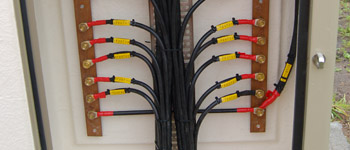Close Interval Potential Surveys
R & R Corrosion recognise that their client's perception of the services and the quality of these is crucial to their success and as such use the client base, past, present and future, as a means of monitoring and improving on quality. The 'R & R Corrosion Ltd Quality Map' provides the vehicle for ensuring that this is continuous and for evaluating our performance against our Key Performance.
Each survey technique has its particular attributes, in general Pearson and signal attenuation coating surveys directly examine the external coating, whereas close interval potential surveys investigate cathodic protection levels and thereby provide an indirect report of coating condition. The dc voltage gradient survey is a hybrid approach, as the technique can locate coating defects and is then able to evaluate whether cathodic protection is achieved at that coating defect.
Close Interval Potential Survey (CIPS)
Close Interval Potential Surveys (CIPS) are carried out to provide a profile of the potential level throughout the length of a metallic structure. The profile can include both 'On' and instantaneous 'Off' potentials to assess the Cathodic Protection performance. This survey procedure can also be used to identify areas affected by interaction.
DC Voltage Gradient (DCVG) Survey
Using a pulsed dc current on the pipeline, the survey investigates voltage gradients associated with external coating defects, using two earth contact probes and a sensitive centre-zero voltmeter. Severity of defects can be assessed and effectiveness of cathodic protection at the defect determined.
Pearson Coating Survey
A survey technique to detect external coating defects, which employs an ac signal injected onto the pipeline and compares the potential gradient between two mobile earth contacts. At coating defects, increases in voltage gradient occur which are noted and recorded as the survey progresses. are noted and recorded as the survey progresses.






